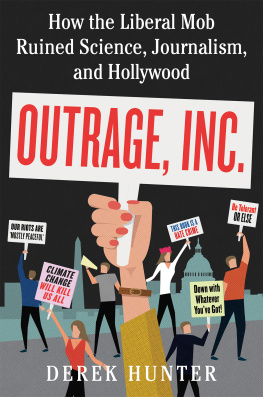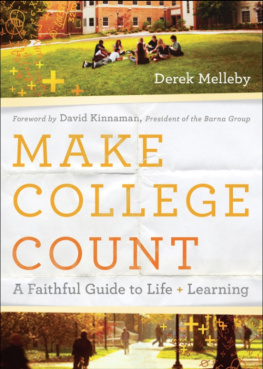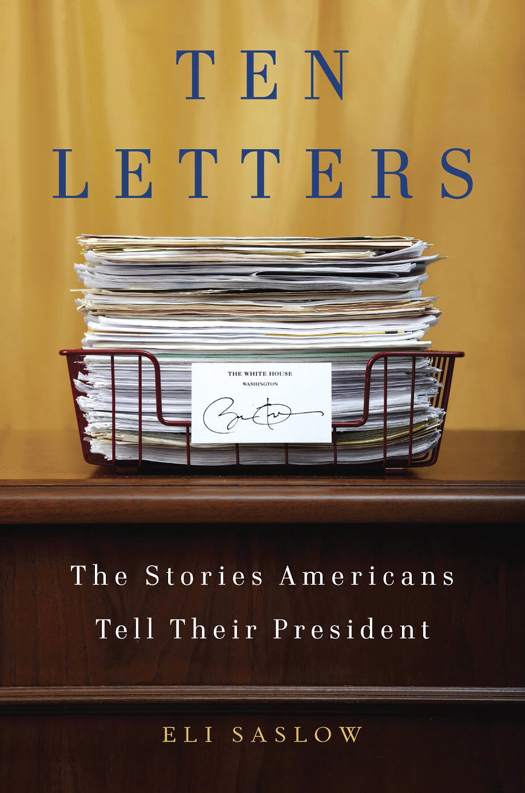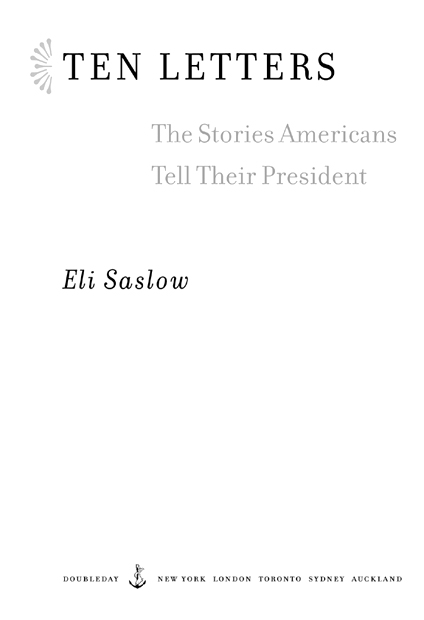Copyright 2011 by Eli Saslow
All rights reserved. Published in the United States by Doubleday, a division of Random House, Inc., New York, and in Canada by Random House of Canada Limited, Toronto.
www.doubleday.com
DOUBLEDAY and the portrayal of an anchor with a dolphin are registered trademarks of Random House, Inc.
Jacket design by Emily Mahon
Jacket photograph Johnny Miller
LIBRARY OF CONGRESS CATALOGING-IN-PUBLICATION DATA
Saslow, Eli.
Ten letters : the stories Americans tell their president / by Eli Saslow.
1st ed.
p. cm.
1. Obama, BarackCorrespondence. 2. United StatesPolitics and government2009 3. United StatesEconomic conditions2009 4. United StatesSocial conditions21st century. I. Title.
E907.S364 2011
973.932092dc22
2011013838
eISBN: 978-0-385-53431-4
v3.1
For Rachel

CONTENTS

CHAPTER 1
I lost my job, my health benefits and my self worth in a matter of 5 days.
T he nightly briefing book arrived at the White House residence just before 8:00 p.m., hand-delivered to President Obama by a junior member of his staff. It was a large, three-ring binder that had been covered in black leather and stamped with the presidential seal, and Obama sometimes eyed it wearily and lamented the arrival of what he called his homework packet. Each night brought another few hundred pages of policy memos and scheduling notes, another deluge of intelligence about two wars, terrorist plots, and the tumbling U.S. economy. Some documents Obama only skimmed. Others he set aside to read the next morning.
He opened the binder and reached for a thin purple folderthe one item that he always read, and usually read first. The contents inside the purple folder had become a fixture of his presidency, shaping his speeches and informing his policies. Senior advisers had referred to it by turns as Obamas lifeline, inspiration, connection to reality, and guide to what people really care about. On this evening, the folder had been labeled with the date: January 8, 2010.
It was a snowy Friday night, the end of another long day at the end of another long week inside the White House. Obama and his family had recently returned from a ten-day trip to Hawaii, but he joked to friends that he already craved another vacation. In Washington, Obama had come back to a Republican resurgence that threatened the passage of his health-care bill; to the attempted terrorist bombing of a passenger flight over Michigan; to the latest American death in Afghanistan, from an explosion on January 3; to the mounting resistance of Tea Party protesters, some of whom marched across the street from his house and waved O BAMA = H ITLER signs; to an approval rating of 50 percent and dropping, the lowest for a second-year president in more than half a century; to the increasingly feeble defense of his own press secretary, Robert Gibbs, who, on this day, had stood in front of eighty reporters during a regular briefing and said of his bosss current outlook: I would say the president is worried about today and worried about the future.
Hours earlier, Obama had made a short statement of his own. It had once again fallen on him to deliver bad news, so he had entered the East Room of the White House at 2:45 p.m., displaying what had become some of his most familiar gesturesthe body language of disappointment. He narrowed his eyes, pursed his lips, and offered a solemn nod once he reached the lectern. Another eighty-five thousand people had lost their jobs during the last month, he said. More than four million had lost jobs in the last year. Almost one million had given up on looking for work entirely. Todays numbers, Obama said, frowning and squinting into the camera lights, are a reminder that the road to recovery is never straight.
There were other reminders: the new gray hair spreading across the sides of Obamas head, the heavy creases running across his cheeks, and the dark circles deepening below his eyes. The president still looked remarkably fit for forty-eight years old, but some medical experts believed the last twelve months had aged Obama by two or three years. His cholesterol was climbing, and he continued to rely on the occasional cigarette to calm his nerves. Like all presidents, he described his responsibilities as never-ending, and his aides conceded that they had underestimated the range of issues Obama would face during his first term. He had flown 152 times on Air Force One in the last year, visiting 30 states and 21 countries. He had given 160 news interviews, delivered 412 speeches, and spoken at 5 funerals. He had committed to a war in Afghanistan and received the Nobel Peace Prize. On an average day, he squeezed in a morning workout after his daughters left for school, rushed to a national security meeting at 8:30 a.m., and continued working virtually uninterrupted until nearly midnight. He usually spent the last two hours of his workday on a couch at home, where he fought off sleep and read the briefing book.
Now he opened the purple folder and glanced at the cover sheet.
MEMORANDUM TO THE PRESIDENT , it read. Per your request, we have attached 10 pieces of unvetted correspondence addressed to you.
Inside, Obama found crumpled notebook paper, smudged ink, sloppy handwriting, and misspelled wordsa collection of ten letters from constituents that he considered his most important daily reading. One letter was from a grade-schooler asking for help on his spelling homework; another was from an unemployed mother demanding a job. Depending on the nature of each letter, Obama sometimes copied them for senior advisers, distributed them to members of his cabinet, or read parts aloud to his wife before bed.
He had first requested a sampling of ten letters on his second day as president, and the purple folder had come six days a week ever since, couriered to Obama even when he was away at Camp David or traveling abroad. The White House mail staff sorted through twenty thousand letters and e-mails addressed to Obama every day, screening for security threats, categorizing by topic, and then picking the most representative ten pieces for the purple folder. The letters chosen each day were the most intimate connection Obama had left to the people he governed. He believed the wide-ranging feedbackquick e-mails and thoughtful letters; congratulations and condemnationsoffered him a unique view beyond the presidential bubble into what he called the real America, a place of uncensored opinion. I will tell you, Obama had said, laughing, my staff is very evenhanded, because about half of these letters call me an idiot. He loved the give and take, aides said. He always read all ten letters and typically wrote back to one or two writers each day, usually responding by hand to those who offered articulate criticism or moving stories of hardship. Obama often said that the letters not only reminded him of why he had run for president; they also reminded him of all the work he had left to do.
But lately the tenor of the letters had changed, becoming darker. There were fewer glowing, post-inauguration thank-you notes and more missives addressed to Dear Jackass, Dear Moron, or Dear Socialist. Former campaign volunteers wrote to express disillusionment; other people shared stories of how Obamas policies had failed them. Earlier in the day, during his somber speech in the East Room, Obama had spoken about the America now reflected back to him in the mail at the beginning of his second year in office. In the letters that I receive at night, he had said, I often hear from Americans who are facing hard timesAmericans whove lost their jobs or cant afford to pay their bills. Theyre worried about what the future holds.















 CONTENTS
CONTENTS